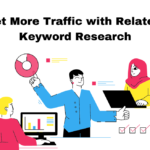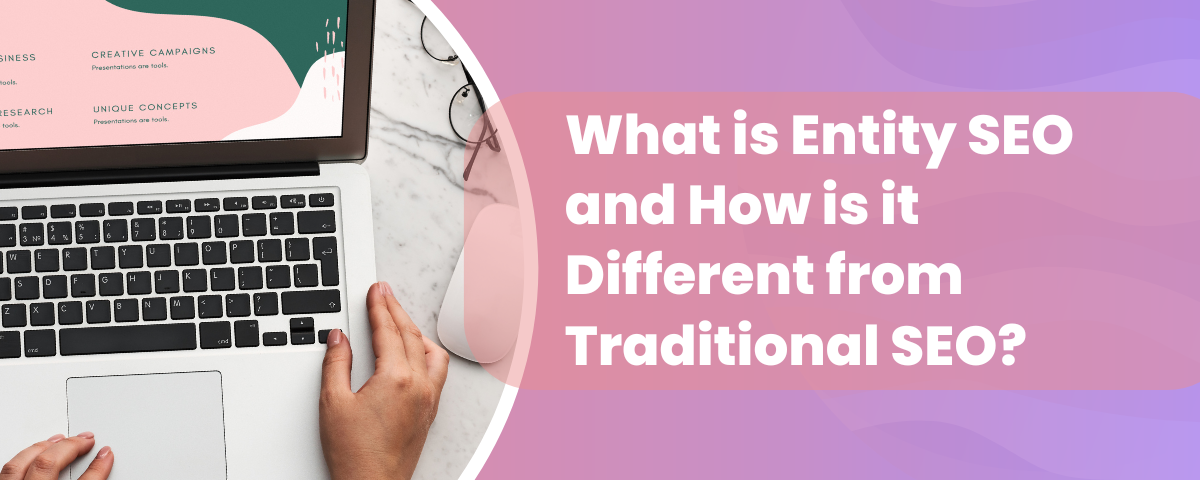
How to Get More Traffic with Related Keyword Research?
September 20, 2024
How to Perform SEO Competitor Analysis: A Step-by-Step Guide
September 27, 2024What is Entity SEO and How is it Different from Traditional SEO?

In the world of search engine optimization (SEO), the concept of Entity SEO has gained a lot of attention recently. It’s an advanced SEO approach that takes a step beyond traditional keyword-based methods. If you’ve heard about Entity SEO but aren’t sure how it differs from Traditional SEO, this blog will break it down in simple terms.
1. What is Entity SEO?
Entity SEO is an approach where search engines focus on the meaning and relationships between concepts (entities) rather than just keywords. In simple terms, an “entity” is anything that exists as a unique object, such as a person, place, organization, or thing.
How Search Engines Understand Entities:
- Google Knowledge Graph: Google uses a vast knowledge base to understand and organize information about entities.
- Entity Recognition: Instead of just seeing words, Google identifies what a term represents (e.g., “Apple” as a company or a fruit).
2. What is an Entity in SEO Terms?
An entity is a clearly defined concept that search engines can distinguish and categorize. For example:
- Person: Elon Musk
- Place: New York City
- Brand: Nike
- Product: iPhone
Entities are connected to other related entities through relationships. Search engines use these connections to provide more accurate search results.
3. How Does Entity SEO Work?
Entity SEO works by focusing on building context around the subject you want to rank for. It’s about creating a web of information that gives search engines a clear understanding of what your content is about.
- Context Over Keywords: Google looks beyond the individual words and examines the overall topic and its relationships to other topics.
- Structured Data: Using schema markup, you can tell search engines directly about the entities you’re discussing.
4. Traditional SEO vs. Entity SEO
Let’s take a closer look at the key differences between Traditional SEO and Entity SEO:
Traditional SEO:
- Keyword-Centric: Focuses heavily on optimizing for specific keywords.
- On-Page Optimization: Involves meta tags, keyword density, and internal linking.
- Backlinks: Emphasizes building backlinks to increase page authority.
Entity SEO:
- Contextual Understanding: Focuses on how your content is understood in the context of related entities.
- Less Dependent on Keywords: While keywords are still important, they are not the sole focus.
- Knowledge Graph Optimization: Entity SEO aims to get content into Google’s Knowledge Graph, which can improve search visibility.
5. Benefits of Entity SEO
Entity SEO offers several advantages in today’s evolving search environment. Here are some of the key benefits:
- Better Search Understanding: It helps search engines understand the true intent and meaning behind your content, improving its relevance.
- More Accurate Results: By focusing on entities, search engines can provide more precise search results, improving the user experience.
- Voice Search Optimization: As voice search grows, Entity SEO becomes more important. Voice search relies on clear, contextual understanding rather than just keywords.
- Featured Snippets: Entity-based content is more likely to be used in Google’s featured snippets and answer boxes.
6. How to Optimize for Entity SEO
Optimizing for Entity SEO involves creating content that is well-connected, informative, and properly structured. Here are some simple ways to get started:
- Use Schema Markup: Structured data tells search engines exactly what your entities are. Use tools like Google’s Structured Data Markup Helper to add schema to your site.
- Create High-Quality, Informative Content: Focus on in-depth content that clearly defines and explains entities related to your business or industry.
- Build Entity-Based Relationships: Link to authoritative websites that relate to the entities you’re targeting. This helps build connections and improve Google’s understanding.
- Leverage Social Proof and Citations: Mention your business on authoritative platforms like Wikipedia or industry-relevant sites to strengthen its entity status.
7. Entity SEO and E-A-T (Expertise, Authoritativeness, Trustworthiness)
Google places a high value on Expertise, Authoritativeness, and Trustworthiness (E-A-T), especially when it comes to content that addresses important topics like finance and health. Entity SEO helps in meeting these E-A-T standards because:
- Entities are Associated with Authority: Entities like well-known experts or brands carry more weight.
- Building Trust through Connections: The more your content is linked to trusted entities, the more credibility it has in the eyes of search engines.
8. How Google Uses Entities in Search Results
Entities play a significant role in the way Google displays search results. Here are some common ways entities are highlighted:
- Knowledge Panels: These appear on the right-hand side of search results and provide detailed information about an entity.
- People Also Search For: Related entities often appear as suggested queries.
- Featured Snippets: Entity-rich content has a higher chance of being featured in snippets, which sit above traditional search results.
9. How Entity SEO Affects Traditional Keyword Strategies
While keywords are still important in SEO, Entity SEO takes precedence over keyword stuffing and outdated optimization tactics. Here’s how:
- Keyword Research: Still relevant, but now your keywords should focus on topics and context rather than just high-volume terms.
- Natural Language: Entity SEO encourages the use of natural language, which aligns with the shift toward voice search.
- Fewer Exact Matches: You no longer need to rely on exact keyword matches. Google understands synonyms and related terms through entity recognition.
10. Entity SEO and Local SEO
For local businesses, entities are crucial in improving local search visibility. By optimizing for location-based entities, you can improve your local rankings.
- Google My Business: Make sure your business information is accurate and up to date to appear in local entity-based searches.
- Local Citations: Consistent NAP (Name, Address, Phone number) details across different directories help establish your business as a trusted local entity.
11. Challenges in Entity SEO
While Entity SEO offers many benefits, it also comes with some challenges:
- Complexity: Entity SEO requires a deep understanding of your topic, as well as how different entities are related.
- Structured Data: Implementing schema markup can be technical, and it requires a solid grasp of structured data principles.
- Time-Consuming: Building authority as an entity takes time and effort, but the long-term rewards are worth it.
Conclusion
Entity SEO is a powerful evolution in search engine optimization. While Traditional SEO focuses on keywords and links, Entity SEO aims to help search engines understand the relationships between topics, entities, and concepts. By optimizing for Entity SEO, you can improve your content’s visibility, increase trust, and take advantage of features like the Knowledge Graph and voice search optimization.
FAQs
1. What is an entity in SEO?
An entity in SEO refers to a distinct, well-defined concept such as a person, place, brand, or product. Entities are recognized by search engines and help improve search relevance.
2. How is Entity SEO different from Traditional SEO?
Entity SEO focuses on the relationships between topics and entities rather than just keywords. Traditional SEO focuses heavily on optimizing for specific keywords and backlinks.
3. Do I still need to use keywords in Entity SEO?
Yes, keywords are still important, but they are no longer the sole focus. Entity SEO encourages a more natural and context-driven approach to content creation.
4. How do I optimize for Entity SEO?
You can optimize for Entity SEO by using structured data (schema markup), creating in-depth content, and building authority through links to other related entities.
5. Is Entity SEO important for voice search?
Yes, Entity SEO is crucial for voice search because it helps search engines understand the context and relationships behind the user’s queries, which often involve natural language.



